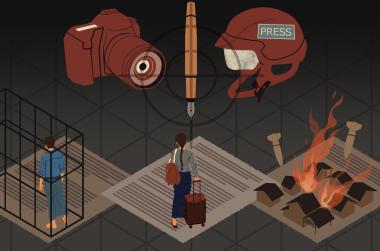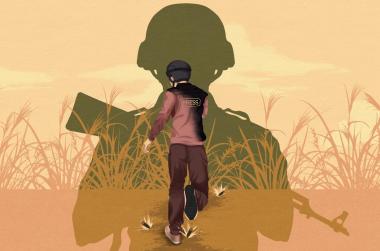The author is a journalist from Central Myanmar who is now in exile. They received support from The Kite Tales to write this diary.
Compared to the worsening crisis in my country, my financial struggles seem trivial. The coup has led to an escalating civil war, human rights violations, economic collapse, daily airstrikes, and environmental destruction.
I have reported on all these issues without pause. And often without pay.
Money worries have gnawed at me like an ulcer, causing deep anxiety and increasing precariousness. Last year my newsroom secured money from the United States that meant I could finally begin planning to reunite with my mother.
Then Donald Trump began slashing support for independent media and all my dreams unravelled.
When I left home, in mid-May 2023, news broadcasts were filled with warnings about Cyclone Mocha. I carefully packed my laptop and camera inside my backpack, making sure they were waterproof. To avoid attracting attention at military checkpoints, I covered them with clothes and other personal belongings so soldiers wouldn’t easily find them if they searched my bag.
Even though I had already cleared the data on my computer, carrying these items could give me away as a journalist. Ever since the 2021 military coup, I had been cautious. I was once arrested while taking photos of soldiers entering my neighborhood. At the police station, I was told I would be sent to interrogation, but was eventually released with a warning after signing a sworn statement. I knew that if I was caught again, it wouldn’t be as easy to get out.
That morning, my mother walked with me to the front gate. Holding my hand, she said through tears: “No matter what happens, come back to me.”
I couldn’t bring myself to look directly at her face. Instead, I just muttered, “Okay,” and quickly walked toward the bus station. I had left home many times before, but this time, my mother and I both knew it wouldn’t be easy to return.
I had been working as a journalist in Myanmar as discreetly as possible since the coup, but it was no longer safe. The military cracked down violently on those who protested, arresting and imprisoning journalists as well. In just the first six months, nearly 1,000 civilians had been killed by the military. According to Reporters Without Borders (RSF), 130 journalists had been arrested and jailed by early 2023. As of 2025, the organisation says more like 150 reporters and press freedom advocates have been jailed. Seven have been killed.
On top of that, by the middle of 2023, I just wasn’t earning enough money and financial struggles started affecting my family. Staying was no longer an option.
I managed to make it out of the country and began writing for a news agency. At first, my salary was just enough for my living expenses. I used part of my earnings to apply for a residence permit. Before I received my official documents, I had to bribe the police whenever they stopped me on the street, sometimes paying between 10% to 30% of my salary. Soon, the news agency informed me that they could no longer pay me, so I had to continue working in exchange for accommodation and meals.
Whenever I spoke with my mother on the phone, she always asked if I was doing okay and reminded me to let her know if I needed money. When I did ask, she always found a way to send it. The truth is, sending for money from Myanmar - where the currency’s value was rapidly declining - was not easy for her. Sometimes, she would urge me to consider switching to another job, mentioning how some young people from our town were managing to live comfortably doing regular jobs. But I lacked the skills for other work, and I believed that continuing my job as a journalist during this time was crucial for documenting history. So, even without income, I continued my work as a journalist.
The next time Myanmar’s people received a collective shock - just like on the day of the coup - was in February 2024, when the military announced it would enforce the conscription law which requires everyone between the ages of 18 to 35 to serve in the military. As battles raged across the country, the military was now forcing young men into the army and sending them to the front lines. Reports started emerging that those who refused were being arrested.
This news sent shockwaves through families in Myanmar and also among those of us living abroad. It was a warning that, sooner or later, our turn would come. My name was already on the list of those eligible for conscription. Young men were fleeing the country in large numbers, and the military warned that if they couldn’t be found, their families would be held responsible. In other words, it was a form of hostage-taking.
Because of this, I repeatedly urged my mother to leave the country and join me. But when she asked, “If you’re already struggling there, how would it work if I come?” I didn’t have a definite answer for her. I could only keep telling her: “Just leave. We’ll figure it out later.”
Toward the end of 2024, the news agency I was working for received funding from a subcontractor of the U.S. Agency for International Development (USAID), and I started getting a salary again. This was the perfect time to bring my mother over. In my hometown, the military had stopped sending written notices and had started taking young men from their homes directly. Many young people had fled, leaving their parents behind to face the consequences.
I urged my mother to leave as soon as possible, and she finally said she was preparing to do so. Meanwhile, I started looking for a place for her to stay. But just a week later, all those plans turned into dust.
I learned on January 24 that due to an executive order by the U.S. President Donald Trump, my salary had been cut off. At the same time, my residence permit was up for renewal, and I didn’t have enough money to pay for it. People who have been deported due to a lack of residency permits have reportedly been arrested under the conscription law of the Myanmar military.
I had to cancel my mother’s trip and asked her to send some money instead.
From what I’ve heard, there is little hope of my salary being reinstated, so I resigned from my job. My mother, as always, told me not to worry about her and once again urged me to switch to another career while I was still young. Instead, me and some other journalists tried to start another news outlet, despite having zero income.
I am determined to bring my mother out as soon as I can. For now, all I can do is continue, dreading the moment my mother calls to tell me that I have officially been drafted into the military.
Artwork by JC who is receiving support by The Kite Tales to produce illustrations.





